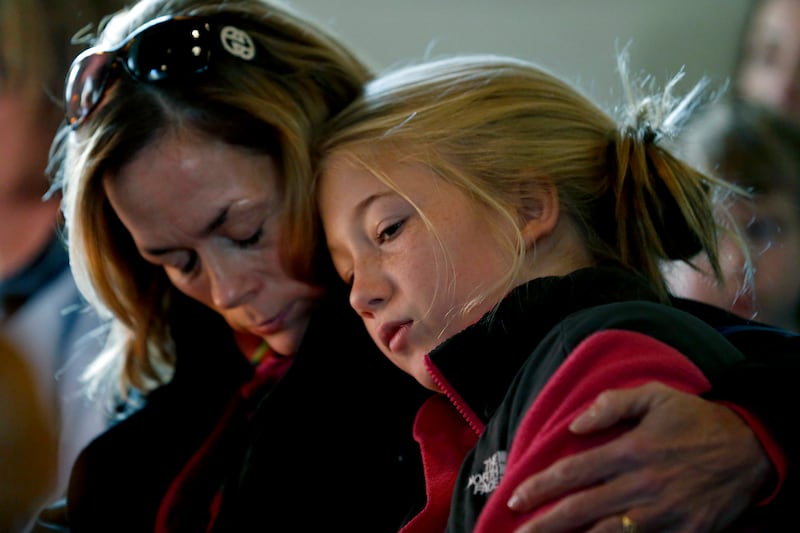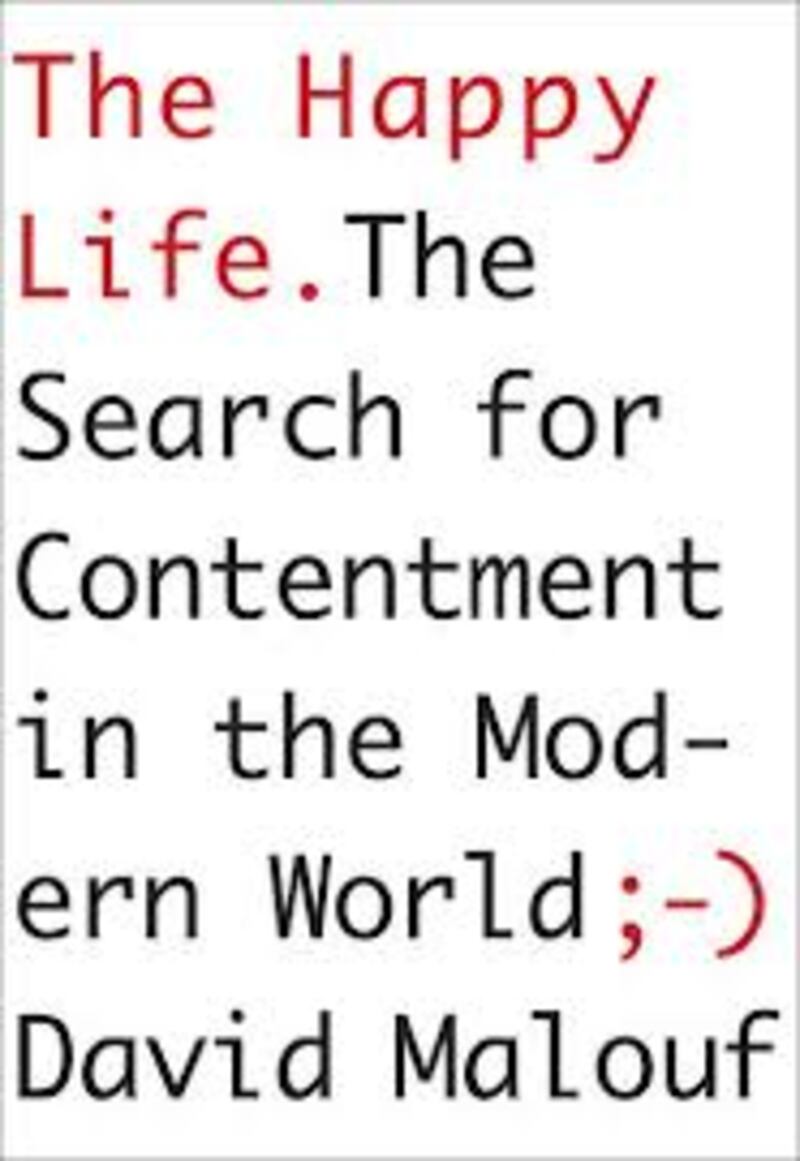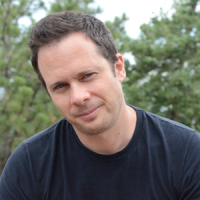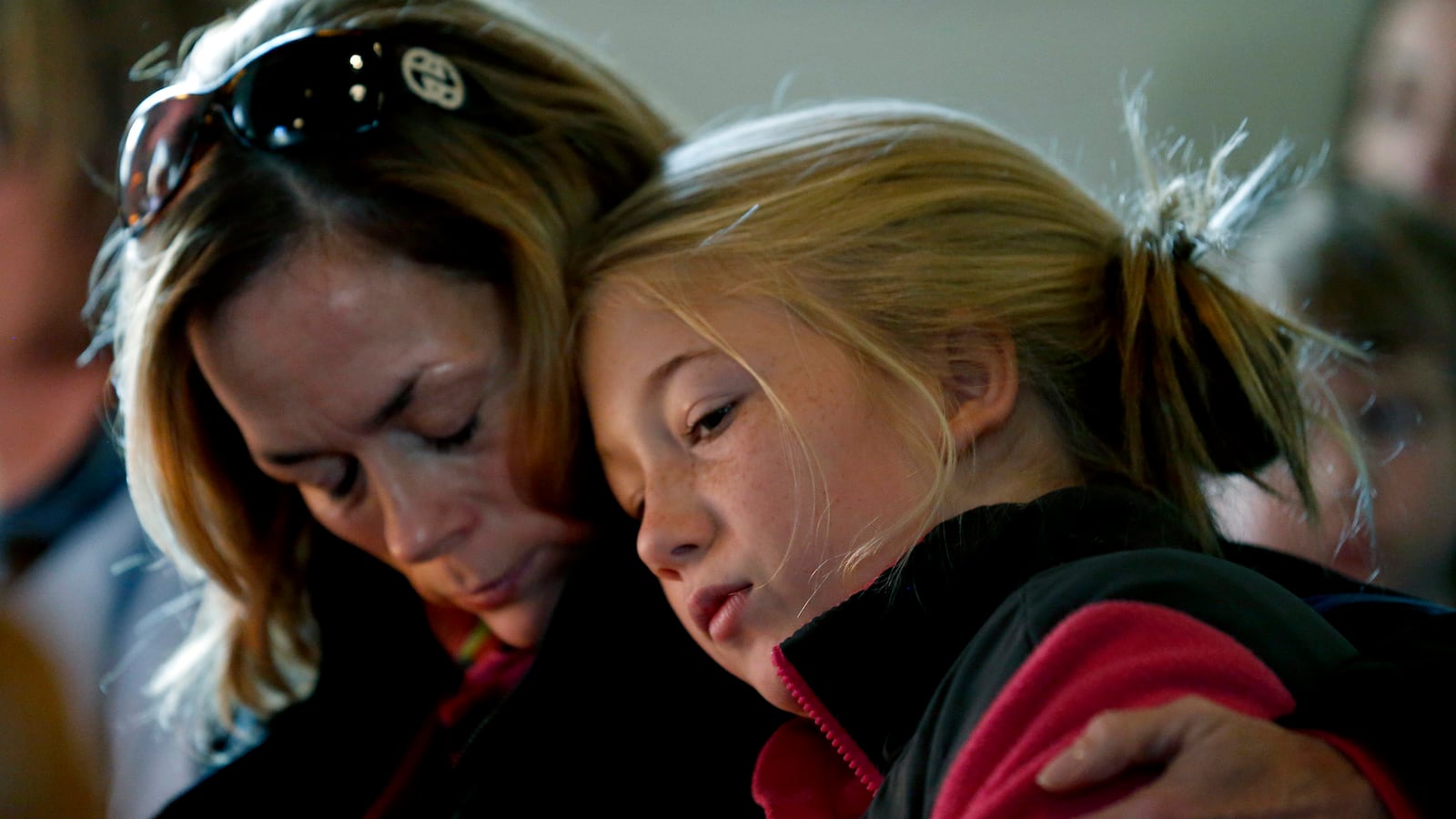For a delusional multitude misreading a Mayan calendar, the world was supposed to end Friday, Dec. 21, 2012. For 20 pairs of parents in Newtown, Connecticut, the world indeed ended, one week earlier, on Friday, Dec. 14, when their children were slaughtered in their elementary school. The president appeared on TV to point out that our hearts are broken, but the metaphor faltered—our hearts are way past broken. Ravaged is closer to the mark.

My barber in Boston—who was also Saul Bellow's (and there ends all similarities between Bellow and myself)—once bestowed upon me this bit of wisdom: “You are only as happy as your unhappiest child.” He's the father of four grown girls and knew what he was talking about. My first son was about to be born, and I was terrified that my manifold inadequacies as a man would sabotage my success as a dad. Raised in a house of hurt, I wanted to build a home of love for my wife and son. Bellow’s barber was attempting to tell me that parents, and especially parents of young children, think about happiness differently from nonparents.
If you had asked me before my sons were born what makes me happy, I would have given you a catacombed reply about my wife in summer dresses and about my work when it’s kind, about my grandmother when she isn’t rebelching the carcinogenic blarney of Bill O’Reilly, and about Milton when a stanza of Paradise Lost finally clicks. Then the answer was much simpler: Ethan and Aiden and all they do. After Newtown my conception of happiness wants to be simpler yet: my kids getting through another American day without being shot dead by some unmedicated warp with a machine gun. You are only as happy as your unhappiest child. And you are fully alive only if your kids are alive. How convenient that our pop culture is currently nursing a zombie obsession, because those 20 pairs of parents in Newtown are now the walking dead. We can add them to the unbearably long list of casualties.
Thinking about happiness after the Newtown massacre is no easy task. Bellow put down some fine sentences about happiness. In Herzog: “A man doesn’t need happiness for himself. No, he can put up with any amount of torment ... provided there is something great, something into which his being, and all beings, can go.” In More Die of Heartbreak: “Benn ought to have been describing his delight, shining with happiness—or if ‘happiness’ is too romantic in these distressing times, at least glowing with mature satisfaction.” In It All Adds Up, about Whitman: “The universe itself ... draws you into happiness: happiness, an efflux of the soul, pervades the open air.” In Humboldt’s Gift (channeling William James): “Happiness is living at the energetic top.” And in Augie March: “I expect happiness and gladness have always been the same.”
But we Americans don’t spend our lives chasing gladness—gladness, contentment, and satisfaction are all too tame, too armchair. At the same time, most of us don’t spend our lives chasing joy, bliss, or ecstasy—those stem from a Dionysian lexicon of the sublime a bit too close to Nietzsche and at odds with our national Christian humility. Thanks to Jefferson’s famous injunction, happiness is the Goldilocks term that feels just right to our American sense of self. And yet every time we hear his crucial word pursuit, we by dint of some eardrum abracadabra actually hear guarantee, which is why when your last partner broke up with you, he or she probably said, “I’m just not happy anymore.” Never mind that when Jefferson chose pursuit he understood its attendant dedication and resolve—steadfast happiness requires onerous striving. Children make for a happy life in part because raising them is so damn difficult. And we die when they die because at the moment of their birth we cease living for ourselves.
We can jettison golden-age nostalgia, the erroneous belief that happiness has only recently become a one-click-away commodity, because the genius who gifted us the seven words we live by—Life, Liberty, and the Pursuit of Happiness—was a perennial debtor with a shopping problem. His comrade Franklin, too, convinced himself that acquisition equaled elation. Our American birthright, this ravening resides in our molecules and has from minute one. I recently asked a Hungarian artist with a child if he planned to have another and he replied, “No. We aren’t collecting children”—the implication being that we Americans are, in the words of comic novelist Peter DeVries, on a “quantitative quest to fill a qualitative gap.” But it should go without saying that children aren’t things we collect. They are, rather, the best education in love, the best lesson in enlargement, and an antidote to the rabid narcissism and dysphoria engendered by the Great Distraction, by our vampiric gadgets and online quasi-lives.
In his new book The Happy Life: The Search for Contentment in the Modern World, Australian novelist David Malouf writes this:
It isn’t a question of whether our mind can accommodate itself to new ways of seeing, to new technologies and realities that are abstract and virtual ... but whether emotionally, psychologically, we can feel at home in a world whose dimensions so largely exceed, both in terms of the infinitely great and the infinitely small, what our bodies can keep in view.
Emotionally and psychologically at home—when we say that the Great Distraction has been in many ways poisonous and wasteful, is that not what we mean, that it has ripped us from the hearth? And when we say that our children nourish us, we mean they provide a psychological and emotional context in which our minds and hearts develop. Contrasting the notion of Jeffersonian happiness with the loftier notions of life and liberty, Malouf notes that happiness “belongs to the world of what is felt, what cannot be presented or numbered on a scale because it cannot be seen.” But any loving parent would be quick to present his children as proof of his happiness—or, to borrow from Stendhal’s perfect definition of beauty, as proof of the promise of happiness. Malouf:
For all the scope, of both time and space, that contemporary forms of knowledge have made available to us, what we can fully comprehend—that is, have direct sensory experience of—remains small; and only with what we have fully comprehended and feel at home in do we feel safe.
Anyone with small children has a special knowledge of “direct sensory experience”: kids are nothing if not a constant fusion of sounds and smells. When I think of those 40 parents in Newtown, I imagine them helplessly inhaling the scent of their dead children’s clothes and turning each time they hear a toddler. Theodore Roethke wrote, “I have myself an inner weight of woe/ That God himself can scarcely bear.” How is happiness again possible for those people? Please dismiss the insulting clichés about silver linings, angels on clouds, and time healing all wounds—God himself can scarcely bear this woe. These wounds will gape eternal.
Happiness is the wrong word—it sets an outsized goal for itself the way gladness, contentment, and satisfaction simply do not. Perhaps Jefferson thought satisfaction too sensual, too Mick Jagger. Perhaps gladness sounded deciduous and contentment dull. But Malouf’s subtitle specifies contentment because, as any sober adult knows, it’s more reasonable and much less disappointing.
Happiness is an odd word in English, so ordinary and so widely used that we seldom ask ourselves how it comes to be and to carry the wide range of emotions we associate with it. Well-being, contentment, gladness, quiet satisfaction, delight—all conditions that belong to the inner world of feeling; a sense of being at home in our own skin, at home with the world, at one with ourselves.

When Malouf wonders how the Great Distraction is eroding our capacity for genuine contentment, he worries for that Wordsworthian “inner world of feeling” so necessary to our becoming fully functional adults, adults whose sensibilities haven’t been blitzkrieged by electronics and denuded by a paucity of immersion in the natural world, an immersion that cultivates our inner world. We can safely assume that the inner world of the Newtown butcher was a howling scape of night.
And I keep wondering what would have happened if his unquiet mother had hoarded books instead of semiautomatic weapons. “The world is too much with us,” wrote Wordsworth, and literature is one way we shut out the world’s clamor and return to ourselves, remember ourselves—it is how we begin to learn what happiness means. About our culture of incessant information and caffeinated reaching into the online ether, Malouf writes, “We are kept in a state of permanent low-level anxiety broken only by outbreaks of alarm.” How can we quash that anxiety and alarm without first unplugging for awhile, without a reemphasis on the small and tactile, without looking to the natural rhythms of children?
A cloudless life is neither possible nor enviable; Nietzsche believed suffering built character, and in Man and Superman, Shaw asserted that a lifetime of happiness would be hell on earth. But the heinous breed of suffering in Newtown is not what Nietzsche had in mind—what can be more hellish than having your child slaughtered? This calamity does not belong solely to 40 parents of murdered kids; it threatens the happiness of everyone, because when children are butchered en masse in their classrooms, the future is butchered with them.
“To be busy is man’s only happiness,” Twain wrote in a letter to his brother, and our kids keep us busy as nobody or nothing else can. They are the worthiest work we have, the “something great” of which Bellow wrote in Herzog. Their smallness brings us back to ourselves, marshals our focus, endows the future with its potential, its possibility. Those 40 parents in Newtown are less busy now, their worth immeasurably diminished; they are tethered to the tremendous lassitude of grief. For the rest of us—our future contentment depends in part on our standing up to the gun culture and declaring: We won’t let you get away with this. Your right to play with and profit from mechanisms of mass murder does not exceed our right to keep our kids alive. We will not accept this life of anomie. There are more of us than there are of you.






